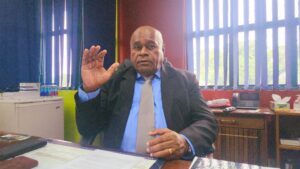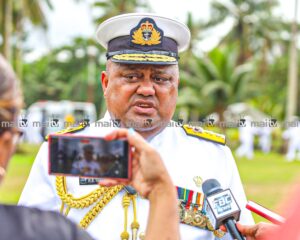Dialogue Fiji (DF) insists the insertion of a provision prohibiting the use of government vehicles in election campaign activities is not enough suggesting that a caretaker administration will best fit, in their electoral law amendment submission which also calls on parliament to lift current restrictions on civil society election engagement.
Presenting their submission to Fiji Parliament’s Committee on Justice, Law and Human Rights in Suva today, DF chief executive Nilesh Lal said the proposed amendment to section 113 of the Electoral Act 2014 outlined in Bill 50 of 2020 “does not fully address the issue of abuse of incumbency to gain an advantage in elections.” Dialogue Fiji also called for either a review or the removal of Section 115 of the same act that prohibits any entity that receives foreign funding, which is the case for many Fiji-based CSOs, to carry out election-related work following the announcement of the election date.
Dialogue Fiji says civil society engagement is critical in building public understanding and confidence in the electoral process, particularly in the period following the confirmation of election date at which point campaigns intensify and people need an independent voice to help them make sense of party promises and subsequently make informed decisions when casting their votes.
Lal alluded to this when responding to questions from the Committee who wanted DF to justify CSO’s election engagement recommendation when they would have time – about five months – before the announcement of the election date to carry out their education/awareness work.
“Civil society organisations work on election relates issues all throughout the electoral cycle,” Lal said.
“The reason why we believe that civil society work ought to be allowed to carry out election-related work is because after the issuance of the writ of elections, that is when election activities intensify and some political parties for instance tend to release their manifestos rather late. It is quite common in democracies for CSO to be analysing manifestos or organising debates or other election-related activities. So at the moment, this is expressly prohibited by the law and we do not see any reasonable basis for that.”
Dialogue Fiji Nilesh Lal
Lal said CSOs take an objective approach in providing facts and information and do not tell voters who to vote for nor do they provide any information that influence the voter to vote in a particular way.
“Our work relates to educating voters about the procedures that are there for the conduct of elections, and the processes and rationale, the allocation for the translation of votes into seats for instance.
“What are some of the elements of our electoral system? What is the rationale for that? Also we create debate, and discourse around that. What is the best electoral system for a divided society like Fiji?
“I think what CSOs do in other countries is objectively analyse the manifestos that have been put out by the political parties to tell the voters [that] if a political party were to get into power and to implement this particular manifesto, this is going to be the financial or economic implication of this particular manifest and the set of policies and measures that are being proposed by this particular political party. So that is very important information.
“During the campaign period, everything is so politically charged that it is very difficult to have independent voices that can provide and verify information that is being put out in the public domain to process. So CSOs can play an important role in doing an objective analysis of all that are being proposed by different parties and then providing that information to voters of Fiji to be able to make an informed choice about the implications of putting a particular political party into government.”
The recommendation was among five pointers Dialogue Fiji raised today with the committee on Bill 50 of 2020 which entails 31 proposed amendments to the Electoral Act 2014.
1. National Candidates List
We welcome changes to section 36 of the Electoral Act to allow the SOE to make determinations relating to the inclusion of party affiliation information in the National Candidates List. Given the absence of any party information on the ballot, the inclusion of this information on the National Candidates List which is available to voters in the voting booth will decrease the incidence of unintended votes.
In a PR system that is essentially based on political parties, the prohibition of party affiliation information by s 36 (6) of the Act was without any reasonable basis. Furthermore, we are of the view that the inclusion of this vital information on the National Candidates List eliminates the need to redesign our ballot paper.
2. Caretaker Conventions
The insertion of S113 (4a) which prohibits the use of government vehicles to conduct campaign activities is a welcome change however it does not fully address the issue of abuse of incumbency to gain advantage in elections. A full range of provisions need to be instituted to ensure that the potential for the abuse of incumbency advantage can be minimized. Given the history of abuse of incumbency in Fijian elections, there is a strong case for the institution of caretaker conventions. These should require that after the dissolution of parliament, the government should go into caretaker mode, and be referred to, in official communication, the media and elsewhere, as a caretaker administration. There should be express limits and prohibitions on the authority of a caretaker government to make policy decisions, enter into major contracts, or make significant appointments. This is to ensure that a government operating without parliamentary oversight does not take actions which inappropriately bind the incoming government or limit its freedom of action.
In addition, there needs to be regulations that prohibit use of state resources to provide publicity or create goodwill for ministers who are contesting elections, as was observed to have happened in the last elections by the Multi-national Observer Group. It is also clear, that in Fiji’s case, the caretaker conventions will need to be binding, significantly detailed and must prescribe penalties for infringements including disqualification as election candidates. 2
3. Seat Allocation Method
Given Fiji’s history of ethnic polarization, and voting behaviour on ethnic lines, adopting an electoral system which does not reward extremist ideologies or race based politics is highly desirable. This has been one of the key reasons the NCBBF had proposed the adoption of a proportional representation system. Given the prevailing socio-political context, apart from the need to shift from a two-party system with their support bases divided along ethnic lines, the accommodation of smaller, moderate parties is a desirable electoral objective.
Whilst the PR system has enabled the inclusion of at least one additional party in the legislature, the experience from the last two elections under the system shows that the 5% election threshold is essentially frustrating efforts to create a strong multi-party system. We note that the 5% election threshold is entrenched in the 2013 Constitution and therefore immensely difficult to change. The seat allocation method, however, is provided for in the Electoral Act and may be amended by a simple majority in parliament. Evidence from other jurisdictions suggests that the D’Hondt method for seat allocation tends to favour larger parties, to the detriment of smaller ones. We have done simulations of the voting results from the last elections and have found a similar outcome in Fiji in the last election.
We therefore, suggest that s104 (4)-(8) be amended to require seat allocation according to the Saint Lague method. This amendment will, to an extent, mitigate the negative effects of the high election threshold, and increase prospects for the inclusion of smaller, moderate parties in the legislature. This change is critical to sustain a multi-party system, otherwise the smaller parties which have been caught in a cycle of exclusion, will either wind up or amalgamate with larger parties. This can easily lead to a race based two party system again as had resulted under the electoral provisions under the 1997 constitution- an outcome that the NCBBF had sought to prevent by adopting the PR system. Strengthening a diverse, multi-party system remains Fiji’s best hope for bringing a shift towards ideology-based politics and political parties, and ending the pre-occupation with race.
4. Section 115
Section 115 of the Act makes it unlawful for any entity that receives foreign funding to organize, engage or participate in any debates, public forums, meetings, interviews, panel discussions or to publish any material relating to the election or any election matter or issue, following the announcement of the election date. This essentially means that civil society organisations, which are typically funded by foreign aid, can not participate in any election related activity once the date of the election has been set. Such a provision is highly rare (if not, non-existent) in democratic states where civil society organisations are considered important election stakeholders and are expected to carry out voter education work, create discourse around elections, organize election debates, analyse manifestos, candidate profiles, media reporting, etc, which are important to create a vibrant civic space for the full participation of citizens in elections.
The MOG had observed that “civil society is less active in elections in Fiji than it is in many other electoral democracies, including in the Pacific” and that this “constitutes a missed opportunity for Fiji to build community understanding and ownership of the electoral process”. Civil society organisations, as independent and apolitical actors, have an important role to play in building the electorate’s trust and confidence in election processes and election management bodies, an attribute that the MOG had also highlighted as lacking in the Fijian context. 3
We take cognizance of legitimate concerns about CSOs peddling misinformation or allowing its resources to be used to advance particular political interests. We, however, believe that these concerns can be dealt with appropriate safeguards in the law rather than an outright ban on all CSO activities relating to elections during the election period. The new subsection S144A , for instance, provides effective safeguards against entities deliberatively spreading misinformation about election processes or unduly diminishing public confidence in the election management bodies. Therefore, we recommend that the parliament consider removing s115 of the Electoral Act.
5. Section 144A
This new provision empowers the SOE to direct a person or political party, whether living in Fiji or abroad, to correct or remove statements that the SOE deems as false statements that are likely to influence outcome of an election or diminish public confidence in the election management bodies. Subsection 144A(4) prescribes relatively harsh penalties such as fines up to $50,000 or imprisonment up to 5 years or both upon conviction for contravention of this section.
Firstly, the law should be clarified to state that persons will only be subject to criminal prosecution under the Act if they refuse to remove or correct the statement(s) deemed as false as provided for under subsections (2) and (3). Any person or entity which follows the directives of the SOE or EC should not be subject to any further prosecution.
Secondly, the provision must be clarified to state that it does not include research papers or conclusions drawn from duly conducted research work and studies such as by university academics, research institutions, etc. There is a de arth of literature on elections in Fiji, and it is highly undesirable to enact a legal provision that is likely to discourage people from researching and publishing on elections. For our democratic processes to be strengthened, research, scholarly debate and public discourse needs to be supported and encouraged.
Dialogue Fiji Submission
Submissions on 56 proposed changes in three of Fiji’s electoral laws – 11 clauses in the Electoral (Registration of Voters) Act 2012, 31 clauses in the Electoral Act 2014 and 14 clauses in the Political Parties (Registration, Conduct, Funding and Disclosures) Act 2013 – continues tomorrow.
The committee will also be hearing from political parties’ Freedom Alliance Party, SODELPA, the National Federation Party and Unity Fiji.









